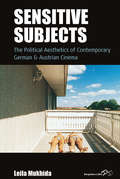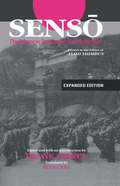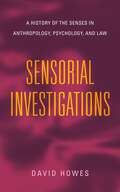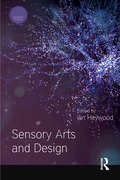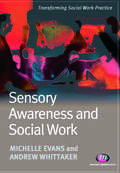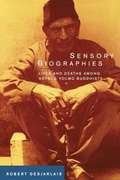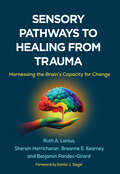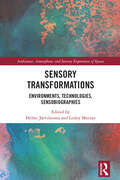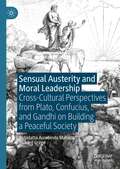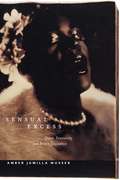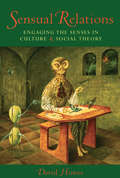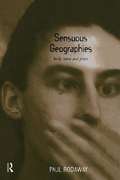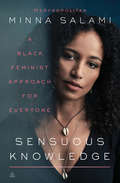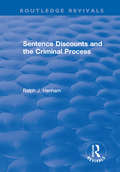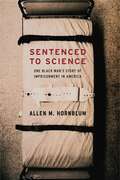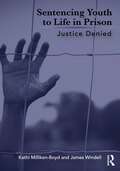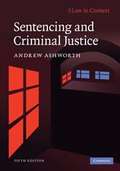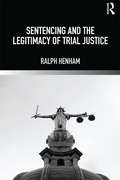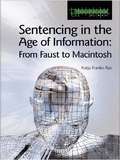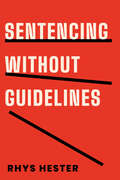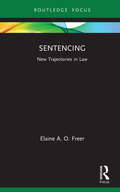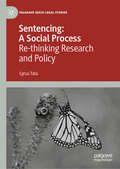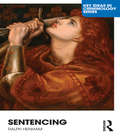- Table View
- List View
Sensitive Subjects: The Political Aesthetics of Contemporary German and Austrian Cinema (Film Europa #23)
by Leila MukhidaBoth politically and aesthetically, the contemporary German and Austrian film landscape is a far cry from the early days of the medium, when critics like Siegfried Kracauer produced foundational works of film theory amid the tumult of the early twentieth century. Yet, as Leila Mukhida demonstrates in this innovative study, the writings of figures like Kracauer and Walter Benjamin in fact remain an undervalued tool for understanding political cinema today. Through illuminating explorations of Michael Haneke, Valeska Grisebach, Andreas Dresen, and other filmmakers of the post-reunification era, Mukhida develops an analysis centered on film aesthetics and experience, showing how medium-specific devices like lighting, sound, and mise-en-scène can help to cultivate political sensitivity in spectators.
Senso: Letters to the Editor of "Asahi Shimbun"
by Frank Gibney Beth CaryThis acclaimed work is an extraordinary collection of letters written by a wide cross-section of Japanese citizens to one of Japan's leading newspapers, expressing their personal reminiscences and opinions of the Pacific war. "SENSO" provides the general reader and the specialist with moving, disturbing, startling insights on a subject deliberately swept under the rug, both by Japan's citizenry and its government. It is an invaluable index of Japanese public opinion about the war.
Sensorial Investigations: A History of the Senses in Anthropology, Psychology, and Law (Perspectives on Sensory History)
by David HowesDavid Howes’s sweeping history of the senses in the disciplines of anthropology and psychology and in the field of law lays the foundations for a sensational jurisprudence, or a way to do justice to and by the senses of other people.In part 1, Howes demonstrates how sensory ethnography has yielded alternative insights into how the senses function and argues convincingly that each culture should be approached on its own sensory terms. Part 2 documents how the senses have been disciplined psychologically within the Western tradition, starting with Aristotle and moving through the rise of Lockean empiricism and cognitive neuroscience. Here, Howes presents an anthropologically informed critique of experimental and cognitive psychology, sensory science, and phenomenology. In part 3, he introduces the paradigm of the “historical anthropology of the senses and sensation” and applies it to the analysis of trade relations between Europe and China in the early modern period, to the treaty-making process in North America during the colonial period, and to all the unresolved disputes over land rights and Indigenous sovereignty that continue to this day, arguing that these differences are rooted in a cultural clash of sensoria.Designed for the classroom, Sensorial Investigations displays an expansive critical engagement with generations of scholarship. It is essential reading for students and scholars of the history and anthropology of the senses, the psychology of sensation, and socio-legal studies.
Sensory Arts and Design (Sensory Studies)
by Ian HeywoodArtists, designers and researchers are increasingly seeking new ways to understand and explore the creative and practical significance of the senses. This ground-breaking book brings art and design into the field of sensory studies providing a clear introduction to the field and outlining important developments and new directions. A compelling exploration of both theory and practice, Sensory Arts and Design brings together a wide variety of examples from contemporary art and design which share a sensory dimension in their development or user experience. Divided into three parts, the book examines the design applications of new technology with sensing capacities; the role of the senses in creating new imaginative environments; and the significance of the senses within different cultural practices. The thirteen chapters cover a highly diverse range of issues – from the urban environment, architecture and soundscapes to gustatory art, multisensory perception in painting, music and drawing, and the relationship between vision and smell. Initiated by Insight, a research group at Lancaster Institute for the Contemporary Arts –widely recognised as a center of research excellence – the project brings together a team of experts from Britain, Europe and North America. This timely book is destined to make a significant contribution to the scholarly development of this emerging field. An important read for students and scholars in sensory studies, design, art, and visual culture.
Sensory Awareness and Social Work (Transforming Social Work Practice Series)
by Andrew Whittaker Michelle EvansUnderstanding sensory needs is fundamental for social work and care management practice. Social workers are trained to reflect on their own practice, make useful application of theory and promote anti-discriminatory practice at all times. This book will assist students in identifying people who have a sensory need and enable them to have the knowledge, skills and values to address this. Designed specifically to encourage students to build confidence and develop skills essential to best practice, this book is specifically structured to address all aspects of sensory need.
Sensory Biographies: Lives and Deaths Among Nepal's Yolmo Buddhists
by Robert R. DesjarlaisSensory Biographies details the life histories of two Yolmo elders, a women in her late eighties known as Kisang Omu, and a Buddhist priest in his mid eighties known as Ghang Lama.
Sensory Futures: Deafness and Cochlear Implant Infrastructures in India
by Michele Ilana FriednerRevealing inequalities and sensory hierarchies embedded in the latest medical technologies and global biotechnical marketsWhat happens when cochlear implants, heralded as the first successful bionic technologies, make their way around the globe and are provided by both states and growing private markets? As Sensory Futures follows these implants from development to domestication and their unequal distribution in India, Michele Ilana Friedner explores biotechnical intervention in the realm of disability and its implications for state politics in the Global South. A signing and speaking deaf bilateral cochlear implant user, Friedner weaves personal reflections into this fine-grained ethnography of everyday negotiations, activist aspirations, and the space of the family. She places sensory anthropology in conversation with disability studies to analyze how normative sensoria are cultivated and the pursuit of listening and speaking capability is enacted. She argues that the conditions of potentiality that have emerged through cochlear implantation have, in fact, resulted in ever narrower understandings of future life possibilities. Rejecting sensory hierarchies that privilege audition, Friedner calls for multisensory, multimodal, and multipersonal ways of relating to the world. Sensory Futures explores deaf people&’s desires to create habitable worlds and grapple with what their futures might look like, in India and beyond, amid a surge in both biotechnical interventions and disability rights activism. With implications for a broad range of disability experiences, this sensitive, in-depth research focuses on the specific experiences of deaf people, both children and adults, and the structural, political, and social possibilities offered by both biotechnological and social &“cures.&”
Sensory Pathways to Healing from Trauma: Harnessing the Brain's Capacity for Change
by Ruth A. Lanius Sherain Harricharan Breanne E. Kearney Benjamin Pandev-GirardThis forward-thinking book explores the impact of psychological trauma on the brain's sensory pathways and demonstrates the crucial role sensory-based interventions can play in recovery. Ruth A. Lanius and associates interweave neurobiological research with evocative case examples and narratives from survivors. The book shines a spotlight on the brain–body disconnect that is part of the lived experience of trauma, and traces what happens in all eight sensory systems when an individual is under threat. Featuring "Bridging to Practice" sections in each chapter, the book reveals how working with sensory pathways can engage the whole brain, promote neuroplasticity, and optimize the effectiveness of standard psychotherapies. Illustrations include eight pages in full color.
Sensory Transformations: Environments, Technologies, Sensobiographies (Ambiances, Atmospheres and Sensory Experiences of Spaces)
by Lesley Murray Helmi JärviluomaThis book offers original insights into cultural transformations of the sensory with particular emphasis on environments and technologies, articulating a special moment in the sensory history of urban Europe as people’s relationship with their environment is increasingly shaped through digital technologies. It is a much-needed addition to Sensory Studies literature with its firmly grounded empirical and theoretical perspectives. It provides radical and impactful food for thought on sensory engagements with urban environments. After reading the book, the reader will have a profound understanding of the original methodology of sensobiographic walking, as well as transdisciplinary and transgenerational ethnographies in different cultural contexts – in this case three European cities. The book is aimed at a large audience of readers. It is equally useful for social and human scientists and students finalizing their MA degrees or working on their doctoral or post-doctoral work, and essential reading for environmental planners, youth workers, city planners and architects, among others.
Sensual Austerity and Moral Leadership: Cross-Cultural Perspectives from Plato, Confucius, and Gandhi on Building a Peaceful Society
by Debidatta Aurobinda Mahapatra Richard GregoThis book examines the link between sensual austerity and moral leadership—a topic largely neglected in contemporary academic scholarship and public policy—by exploring the comparative cross-cultural perspectives of Plato, Confucius, and Gandhi, on this theme. Despite the diverse cultural contexts that gave rise to their respective philosophical perspectives, they shared similar views on what might constitute a universal and perennial basis for individual moral development in any harmonious political order. They all agreed that sensual austerity is necessary for the realization of a flourishing society and political culture: recognizing that control over sensual desire is both a vehicle for individual moral self-cultivation and social-political progress. Sensual austerity is thus an essential aspect of any morally governed person, institution, state, or society. The book also argues that further examination of this theme may assist scholars and policymakers in developing more peaceful and harmonious national and global communities.
Sensual Excess: Queer Femininity and Brown Jouissance (Sexual Cultures #51)
by Amber Jamilla MusserReimagines black and brown sensuality to develop new modes of knowledge productionIn Sensual Excess, Amber Jamilla Musser imagines epistemologies of sensuality that emerge from fleshiness. To do so, she works against the framing of black and brown bodies as sexualized, objectified, and abject, and offers multiple ways of thinking with and through sensation and aesthetics. Each chapter draws our attention to particular aspects of pornotropic capture that black and brown bodies must always negotiate. Though these technologies differ according to the nature of their encounters with white supremacy, together they add to our understanding of the ways that structures of domination produce violence and work to contain bodies and pleasures within certain legible parameters.To do so, Sensual Excess analyzes moments of brown jouissance that exceed these constraints. These ruptures illuminate multiple epistemologies of selfhood and sensuality that offer frameworks for minoritarian knowledge production which is designed to enable one to sit with uncertainty. Through examinations of installations and performances like Judy Chicago’s The Dinner Party, Kara Walker’s A Subtlety, Patty Chang’s In Love and Nao Bustamante’s Neapolitan, Musser unpacks the relationships between racialized sexuality and consumption to interrogate foundational concepts in psychoanalytic theory, critical race studies, feminism, and queer theory. In so doing, Sensual Excess offers a project of knowledge production focused not on mastery, but on sensing and imagining otherwise, whatever and wherever that might be.
Sensual Relations: Engaging the Senses in Culture and Social Theory
by David HowesWith audacious dexterity, David Howes weaves together topics ranging from love and beauty magic in Papua New Guinea to nasal repression in Freudian psychology and from the erasure and recovery of the senses in contemporary ethnography to the specter of the body in Marx. Through this eclectic and penetrating exploration of the relationship between sensory experience and cultural expression, Sensual Relations contests the conventional exclusion of sensuality from intellectual inquiry and reclaims sensation as a fundamental domain of social theory. David Howes is Professor of Anthropology, Concordia University, Montreal, Quebec.
Sensuous Geographies: Body, Sense and Place
by Paul RodawayThe contemporary challenge of postmodernity draws our attention to the nature of reality and the ways in which experience is constructed. Sensuous Geographies explores our immediate sensuous experience of the world. Touch, smell, hearing and sight - the four senses chiefly relevant to geographical experience - both receive and structure information. The process is mediated by historical, cultural and technological factors. Issues of definition are illustrated through a variety of sensuous geographies. Focusing on postmodern concerns with representation, the book brings insights from individual perceptions and cultural observations to an analysis of the senses, challenging us to reconsider the role of the sensuous as not merely the physical basis of understanding but as an integral part of the cultural definition of geographical knowledge.
Sensuous Knowledge: A Black Feminist Approach for Everyone
by Minna SalamiSensuous Knowledge is a collection of thought-provoking essays that applies an Africa-centered feminist sensibility to issues of racism and sexism. In this riveting meditation, Minna Salami, the creator of the internationally popular, multiple award-winning blog MsAfropolitan, challenges our illusions about oppression and liberation and dares women to embrace their power. What does it mean to be oppressed? What does it mean to be liberated? Why do women choose to follow authority even when they can be autonomous? What is the cost of compromising one&’s true self? What narratives particularly subjugate women and people of African heritage? What kind of narrative can heal and empower? As she considers these questions, Salami offers fresh insights on key cultural issues that impact women&’s lives, including power, beauty, and knowledge. She also examines larger subjects, such as Afrofuturism, radical Black feminism, and gender politics, all with a historical outlook that is also future oriented. Combining a storyteller&’s narrative playfulness and a social critic&’s intellectual rigor, Salami draws upon a range of traditions and ideologies, feminist theory, popular culture—including insights from Ms. Lauryn Hill, Beyoncé, Audre Lorde, Toni Morrison, and others—science, philosophy, African myths and origin stories, and her own bold personal narrative to establish a language for change and self-liberation. Sensuous Knowledge inspires reflection and challenges us to formulate our own views. Using ancestral knowledge to steer us toward freedom, Salami reveals the ways that women have protested over the years in large and small ways—models that inspire and empower us to define our own sense of womanhood today.
Sentence Discounts and the Criminal Process (Routledge Revivals)
by Ralph J HenhamThis title was first published in 2001: This volume presents the results of an empirical investigation into the operation of sentence discounts for guilty pleas in the Crown Court. It focuses primarily on the nature of judicial compliance with the S48 Criminal Justice and Public Order Act 1994 and those variables in sentence decision making which impact on this process. It also examines the relative use made of sentence discounts and the nature and relevance of court of appeal guidance. In doing so, it raises important theoretical issues relating to sentencing research and addresses the implications for sentencing policy and practice. With empirical research on the operation of the sentencing process being comparatively rare, the book should make an important contribution to the existing literature.
Sentenced to Science: One Black Man's Story of Imprisonment in America (G - Reference, Information and Interdisciplinary Subjects)
by Allen M. Hornblum Harriet WashingtonFrom 1951 until 1974, Holmesburg Prison in Philadelphia was the site of thousands of experiments on prisoners conducted by researchers under the direction of University of Pennsylvania dermatologist Albert M. Kligman. While most of the experiments were testing cosmetics, detergents, and deodorants, the trials also included scores of Phase I drug trials, inoculations of radioactive isotopes, and applications of dioxin in addition to mind-control experiments for the Army and CIA. These experiments often left the subject-prisoners, mostly African Americans, in excruciating pain and had long-term debilitating effects on their health. This is one among many episodes of the sordid history of medical experimentation on the black population of the United States.The story of the Holmesburg trials was documented by Allen Hornblum in his 1998 book Acres of Skin. The more general history of African Americans as human guinea pigs has most recently been told by Harriet Washington in her 2007 book Medical Apartheid. The subject is currently a topic of heated public debate in the wake of a 2006 report from an influential panel of medical experts recommending that the federal government loosen the regulations in place since the 1970s that have limited the testing of pharmaceuticals on prison inmates.Sentenced to Science retells the story of the Holmesburg experiments more dramatically through the eyes of one black man, Edward “Butch” Anthony, who suffered greatly from the experiments for which he “volunteered” during multiple terms at the prison. This is not only one black man’s highly personal account of what it was like to be an imprisoned test subject, but also a sobering reminder that there were many African Americans caught in the viselike grip of a scientific research community willing to bend any code of ethics in order to accomplish its goals and a criminal justice system that sold prisoners to the highest bidder.
Sentencing Serious Sex Offenders: How Judges Decide when Discretion Is Wide
by Diarmuid GriffinAddressing a lack of high-quality sentencing information in Ireland, this important book explores the factors that influence judges to impose a sentence of long-term imprisonment in sexual offence cases. Judges have made it clear that sentences of 15 years to life imprisonment are to be reserved for offending that is ‘truly egregious’. Griffin, using over 100 serious sexual offence cases, examines what this means in practice. The book is designed to be used in the classroom and the court, as well as providing a solid evidence base to inform the public and policy discourse on sentencing.
Sentencing Youth to Life in Prison: Justice Denied
by James Windell Kathi Milliken-BoydThis book analyzes the impact of the U.S. Supreme Court rulings deeming juvenile life without parole (LWOP) sentences to be cruel and unusual punishment. These Court decisions brought about controversy and resistance in the criminal justice field, while at the same time providing hope for those 2,300 people who never thought they had a chance to experience life as an adult outside prison. By looking in depth at the lives of some of the individuals serving life terms, and understanding both the prosecutors who oppose review and resentencing of juvenile lifers and those who are sincerely following the Supreme Court’s guidelines, this book provides a comprehensive understanding of the issues – as well as the people – involved in the sentencing (and potential resentencing) of juveniles to life without the possibility of parole. The authors provide unique, perceptive and straightforward profiles on some of the prisoners who were ultimately sentenced to LWOP after being involved in criminal offenses committed before their 18th birthdays. The book poignantly features the experiences of young people who did not commit a murder yet were still sentenced to life terms, but also delves into the perspectives of the families of victims of juvenile offenders, prosecutors on both sides of the issue, psychologists who have interviewed many of the juvenile lifers and advocates for change in the way juveniles are treated by the criminal justice system. The decisions in Miller v. Alabama and Montgomery v. Louisiana clearly demonstrated that the Court’s view of juveniles evolved over decades to reflect advances in our understanding of the unique characteristics of youth and their involvement in juvenile crimes. This book takes the position that the sentence of life without the possibility of parole for youth is wasteful of both human lives and scarce public resources. The authors write about the human concerns on both sides of the question, and, ultimately, allow readers to make their own decisions about how society should best handle juvenile offenders. This engaging ethnographic treatment will appeal to students and scholars of criminology, corrections, juvenile justice, and delinquency; practitioners working in social policy; and all those interested in a criminal justice system capable of positive outcomes for involved youth.
Sentencing and Criminal Justice
by Andrew AshworthAndrew Ashworth expertly examines the key issues in English sentencing policy and practice including the mechanisms for producing sentencing guidelines. He considers the most high-profile stages in the criminal justice process such as the Court of Appeal's approach to the custody threshold, the framework for the sentencing of young offenders and the abiding problems of previous convictions in sentencing. Taking into account the Criminal Justice and Immigration Act 2008 and the Coroners and Justice Act 2009, the book's inter-disciplinary approach places the legislation and guidelines on sentencing in the context of criminological research, statistical trends and theories of punishment. By examining the law in relation to elements of the wider criminal justice system, including the prison and probation services, students gain a rounded perspective on the relevant principles and problems of sentencing and criminal justice.
Sentencing and the Legitimacy of Trial Justice
by Ralph HenhamThis book discusses the under-researched relationship between sentencing and the legitimacy of punishment. It argues that there is an increasing gap between what is perceived as legitimate punishment and the sentencing decisions of the criminal courts. Drawing on a wide variety of empirical research evidence, the book explores how sentencing could be developed within a more socially-inclusive framework for the delivery of trial justice. In the international context, such developments are directly relevant to the future role of the International Criminal Court, especially its ability to deliver more coherent and inclusive trial outcomes that contribute to social reconstruction. Similarly, in the national context, these issues have a vital role to play in helping to re-position trial justice as a credible cornerstone of criminal justice governance where social diversity persists. In so doing the book should help policy-makers in appreciating the likely implications for criminal trials of ‘mainstreaming’ restorative forms of justice. Sentencing and the Legitimacy of Trial Justice firmly ties the issue of legitimacy to the relevant context for delivering ‘justice’. It suggests a need to develop the tools and methods for achieving this and offers some novel solutions to this complex problem. This book will be a valuable resource for graduate students, academics, practitioners and policy makers in the field of criminal justice as well as scholars interested in socio-legal and cross-disciplinary approaches to the analysis of criminal process and sentencing and the development of theory and comparative methodology in this area.
Sentencing in the Age of Information: From Faust to Macintosh
by Katja Franko AasHow does the fact that we live in information societies reflect on the nature of penal discourse and practice? Applying media and communication studies to sentencing and penal culture, Kate Franko Aas offers a lucid and innovative account of how punishment is adjusting to a new cultural climate marked by growing demands for information processing, transparency and accountability. This significant book explores a number of recent penal developments, such as risk assessment instruments, sentencing guidelines and computerized sentencing information systems, and argues that they are instruments of justice with so-called Macintosh traits, offering pre-programmed answers and solutions. Franko Aas touches upon issues of decision-making at-a-distance, the exercise of discretion, databases, disembodiment and the changing nature of subjectivity. She explores information technology as a cultural environment with profound implications for the nature of penal knowledge, governance and identity constitution. Sentencing in the Age of Information is essential reading for scholars and students interested in sentencing, penal culture, criminology, sociology of law and media and communication studies. Joint winner of the 2006 Hart/Socio-Legal Studies Association Book Prize.
Sentencing without Guidelines
by Rhys HesterSentencing matters. Reform initiatives hope to impart more uniformity and fairness in sentencing. Tough-on-crime laws like “three strikes” and mandatory minimum provisions deprive judges of sentencing discretion. While sentencing guidelines have been adopted by approximately 20 states since the early 1980s, many judges operate without guidelines. Sentencing without Guidelines is Rhys Hester’s deep dive into how South Carolina, which never passed sentencing guideline legislation, nonetheless created meaningful punishment reform. It achieved uniformity in sentencing with a traveling circuit of judges, informal norms among judges, and the unique phenomenon of the “Plea Judge” to manage cases. Hester examines how prior convictions, race, and geographical differences impact sentences to explain why individuals get the criminal sentences they do. He also explores how legal reform mechanisms can influence punishment goals and policy. Sentencing without Guidelines shows the benefits and drawbacks South Carolina experienced as it met sentencing reform goals. These lessons can be translated into policy for other jurisdictions.
Sentencing: New Trajectories in Law (New Trajectories in Law)
by Elaine A. FreerThis book examines the process and purpose of sentencing in the criminal justice system, beyond the confines of its legalistic aspects. Sentencing is the process that concludes any criminal trial that ends with the defendant being convicted, and any hearing in which a defendant pleads guilty. Those convicted of crime have been subject to sentencing as the method of imposing a punishment for their offences since the earliest existence of anything we would recognise as a criminal justice system. Yet the rationale behind sentencing, and the process by which it happens, has long been viewed through a traditional lens. In contrast, this book considers not just the process by which a Judge arrives at a numerical sentence of months in custody or the amount of a fine, but the wider meanings and effects of sentencing, as seen through the lens of various ideas of social justice. The book will appeal to students, academics, and legal practitioners who wish to consider a different perspective on the well-known and well-researched, but often shifting, area of sentencing.
Sentencing: Re-thinking Research and Policy (Palgrave Socio-Legal Studies)
by Cyrus TataThis book asks how we should make sense of sentencing when, despite huge efforts world-wide to analyse, critique and reform it, it remains an enigma.Sentencing: A Social Process reveals how both research and policy-thinking about sentencing are confined by a paradigm that presumes autonomous individualism, projecting an artificial image of sentencing practices and policy potential. By conceiving of sentencing instead as a social process, the book advances new policy and research agendas. Sentencing: A Social Process proposes innovative solutions to classic conundrums, including: rules versus discretion; aggravating versus mitigating factors; individualisation versus consistency; punishment versus rehabilitation; efficient technologies versus the quality of justice; and ways of reducing imprisonment.
Sentencing: Time for a Paradigm Shift (Key Ideas in Criminology)
by Ralph HenhamSentencing is the process through which the legitimacy of punishment is declared and justified. However, it is increasingly portrayed as a social activity which should be more responsive to the pluralistic needs and values of individuals and communities in contemporary society. It will therefore have to adapt to an array of different perceptions of what justice is and how it should be delivered, as well as different sensitivities and emotional responses to sentencing processes and outcomes. At a time when fundamental questions are being asked about the relevance of existing forms of punishment in contemporary society, Sentencing argues for a profound normative understanding of the relationship between sentencing and its perception by citizens – vital if we are to fully comprehend the nature and significance of punishment, and the particular challenges it faces as a force for social cohesion. Henham explores this theme by focusing on key areas of debate within the field: the treatment of gender and race in sentencing the future role of sentencing in criminal justice governance the development of new criteria for evaluating sentencing within a more socially-inclusive framework. Henham suggests that a greater focus on the relationship between penal ideology and the impact of sentencing in the wider community is essential for effective future policy-making in this area. Sentencing will be useful for both undergraduate and postgraduate students of law, criminology, criminal justice and sociology, as well as for academics and criminal justice policymakers.
